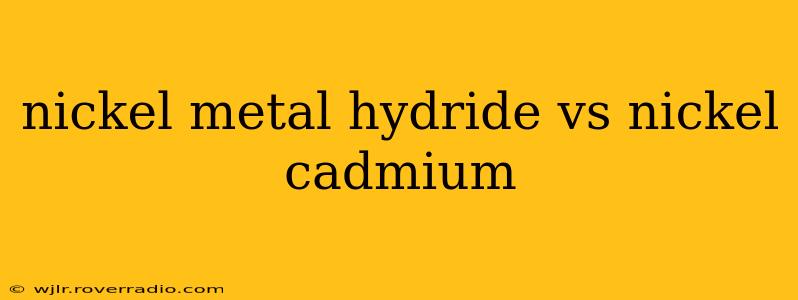Choosing the right rechargeable battery can be tricky, especially with so many options available. Two prominent contenders in the rechargeable battery arena are Nickel Metal Hydride (NiMH) and Nickel Cadmium (NiCd). While both offer rechargeable capabilities, they differ significantly in performance, environmental impact, and overall cost. This detailed comparison will help you understand the key differences and decide which battery type best suits your needs.
What are NiMH and NiCd Batteries?
Both NiMH and NiCd batteries are rechargeable electrochemical cells that use a chemical reaction between nickel and another metal to generate electricity. The key difference lies in the other metal: NiCd uses cadmium, while NiMH uses a metal hydride (typically an alloy of rare earth metals). This seemingly small difference has significant implications for their characteristics.
NiMH Advantages over NiCd
-
Higher Energy Density: NiMH batteries generally pack more energy into the same physical size compared to NiCd batteries. This translates to longer runtimes for the same battery size.
-
Lower Environmental Impact: NiCd batteries contain cadmium, a highly toxic heavy metal. Their disposal is strictly regulated due to environmental concerns. NiMH batteries, lacking cadmium, are considered more environmentally friendly.
-
No Memory Effect: NiCd batteries suffer from a "memory effect," where repeated charging before fully discharging can reduce their overall capacity. NiMH batteries have a significantly reduced memory effect, making them more convenient to use.
-
Longer Lifespan (Cycle Life): While NiCd batteries boast a high cycle life, NiMH batteries often surpass them in terms of the number of charge-discharge cycles they can endure before significant capacity degradation.
NiCd Advantages over NiMH
-
Lower Self-Discharge Rate: NiCd batteries retain their charge much better over time compared to NiMH batteries, which experience a higher self-discharge rate. This means NiCd batteries can sit unused for longer periods and still maintain a significant portion of their charge.
-
Higher Discharge Rate Capability: In applications requiring high current bursts, NiCd batteries can often deliver better performance than NiMH batteries.
-
Lower Initial Cost (Historically): While this gap is shrinking, historically NiCd batteries were often cheaper to purchase upfront than comparable NiMH batteries.
Which Battery is Right for You?
The "better" battery depends entirely on your specific application and priorities.
-
Choose NiMH if: You prioritize environmental friendliness, longer runtime for a given size, and ease of use (lack of memory effect). These are ideal for everyday devices like flashlights, remote controls, and toys.
-
Choose NiCd if: You need a battery that can withstand high-discharge rates, retains its charge for extended periods of inactivity, and initial cost is a significant concern. Specific niche applications might still favor NiCd due to its robust performance in certain conditions.
Frequently Asked Questions (FAQs)
Are NiMH batteries better than NiCd batteries?
Generally, yes, for most consumers. NiMH batteries offer higher energy density, are more environmentally friendly, lack the memory effect, and often have longer lifespans. However, NiCd batteries still have advantages in certain specialized applications.
What are the disadvantages of NiMH batteries?
NiMH batteries have a higher self-discharge rate than NiCd, meaning they lose charge faster when not in use. They also may not perform as well under high-discharge conditions as NiCd batteries.
What are the disadvantages of NiCd batteries?
The significant disadvantages of NiCd batteries are their toxicity (due to cadmium) and the memory effect.
Can you mix NiMH and NiCd batteries?
It's generally not recommended to mix NiMH and NiCd batteries in the same device, as their different voltage characteristics and charging requirements can lead to damage.
How do I dispose of NiCd batteries safely?
NiCd batteries should be disposed of properly through designated recycling programs. Never throw them in the regular trash. Check your local waste management authority for instructions.
By weighing the advantages and disadvantages of each battery type, you can make an informed decision and select the best rechargeable battery solution for your specific needs. Remember to always dispose of batteries responsibly, considering the environmental impact of each type.
